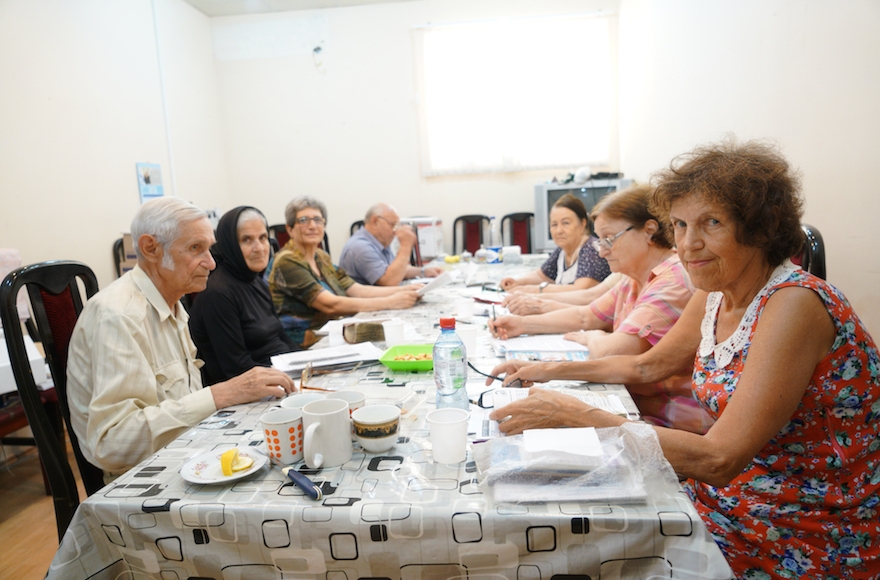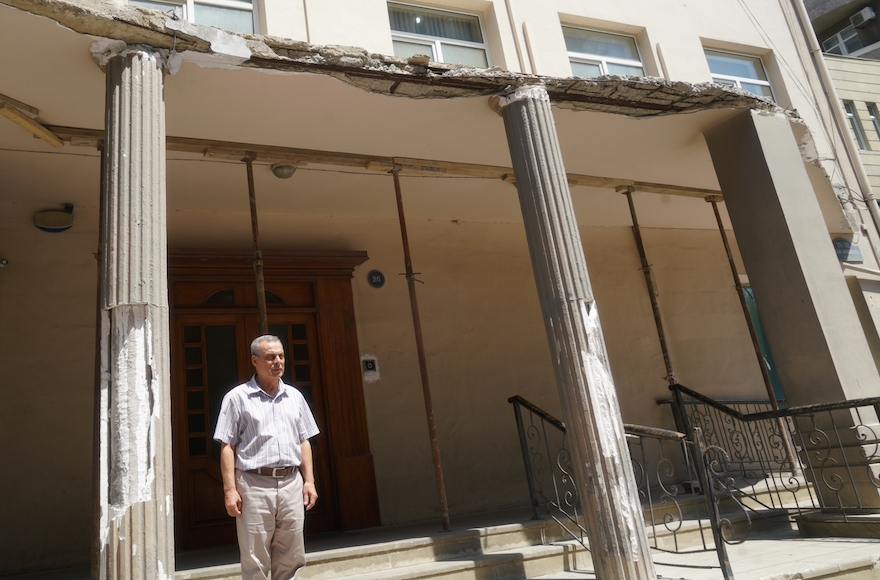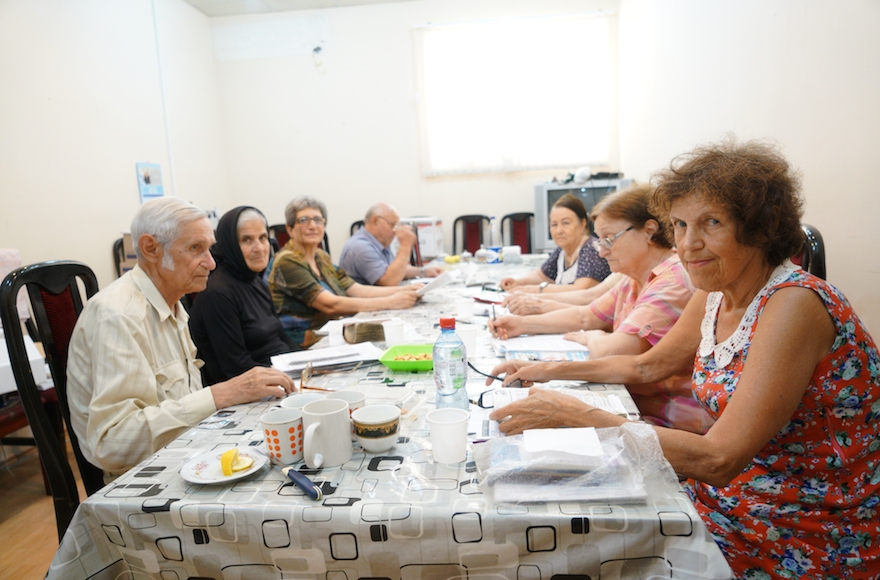
Arnold Zeligman, left, teaching Hebrew to Bella Regimov, wearing head cover, and other students at The Jewish House in Baku, Azerbaijan, July 18, 2018. (Cnaan Liphshiz)
BAKU, Azerbaijan (JTA) — About one year after Bella Regimov’s two children left their native country for Israel along with many of her friends and relatives, she began feeling socially isolated.
On her own in Azerbaijan’s family-oriented society, the 76-year-old was losing “the will to get up in the morning” following their immigration in the early 2000s, she said.
But in 2006, things turned around. That year, she started volunteering at the Jewish community center that the American Jewish Joint Distribution Committee, or JDC, had opened two years earlier in this capital city of the Caucasus republic.
“This became my home, my real home,” Regimov said of The Jewish House, a crumbling building on a busy street bordering the Baku Railway Station. “I come here first thing in the morning and I stay to close the place.”
Since she started volunteering, Regimov has come to depend on the center for social interaction, a sense of purpose and even exercise: She walks at least two miles a day to the center and back to her home in Baku’s old Jewish quarter. In the summer, she walks briskly to minimize her exposure to the scorching sun, slowing down only under the shade of the buildings featuring the city’s ubiquitous beige sandstone tiles.
But this month, Regimov and dozens of others of elderly Jews in Baku will have to leave the building that houses the city’s only Jewish community center. JDC has sold it to streamline its expenses in a city with a dwindling Jewish community.
The sale is part of a broader effort by JDC to respond to shifting Jewish community demographics, the New York-based group said. In the case of Baku, whose Jewish population has shrunk from 16,000 to 8,000 since 2000, JDC will move its offices to a much smaller space, a JDC spokesperson said.
Many Azeri Jews have left for Russia and Israel in search of opportunities unavailable under the nepotist economy of Azerbaijan, an oil-rich country where many residents nonetheless live in abject poverty.
As the community shrinks, Regimov and other elderly Jews value even more the institutions that have been their solution to loneliness.
“Please tell them not to take this away from us,” she said. “It’s my reason for getting up in the morning, and I’m not the only one.”
The Jewish House, at 13,000 square feet, includes an auditorium, workshop rooms, classrooms and space for exhibitions. JDC said the new space is about five times smaller, but will have space for activities and a day center for seniors.
Still, Shaul Davidov, who has headed The Jewish House since its opening, said the change means the “end of an era” for his community.
The organizations that run Jewish communal activities in Baku will find a new address there, he said, but “it means a painful loss” for Regimov and dozens of elderly Jews who come to The Jewish House daily to play cards, participate in arts and crafts lessons and study Hebrew.
“I don’t think they’ll come. It will not be the same,” he said.
Arnold Zeligman, an 86-year-old volunteer teacher of Hebrew at The Jewish House, is determined to resume his activity in the new space.
“But where will we have concerts? Where will we have a festive kabbalat Shabbat?” he asks. “I don’t see it happening, and it’s a very big shame.”
The Jewish House’s annual upkeep costs about $60,000, Davidov said.

Saul Davidov greeting regulars at the entrance to The Jewish House, July 18, 2018. (Cnaan Liphshiz)
Baku has two active synagogues in the old Jewish quarter. Both are small in comparison to The Jewish House and “our people don’t really feel like it’s their space there,” said Zeligman, whose only son lives in Israel.
His students are a dozen or so pensioners, who enjoyed the unplanned study break they were given last month while Zeligman spoke to JTA. Watching him wrap his tongue around some of the best Hebrew-language words in his vocabulary, they crack jokes at his expense in Juhuri, the dying dialect spoken here by many Jews.
A mix of Farsi and Hebrew, it is the centuries-old language of the Mountain Jews — a stream of Judaism that is considered neither Sephardic nor Ashkenazi, and whose members have their own manner of singing scripture and songs. About half of Azerbaijan’s Jews are Mountain Jews. The rest are Ashkenazim who came here before 1991, when Russia still ruled what is now Azerbaijan.
Fading and lacking an agreed-upon alphabet — the few Juhuri books in existence are divided into volumes using Cyrillic, Arabic, Hebrew and Latin — the pensioners’ native tongue is no use for communicating with grandchildren in Israel and beyond over Skype, requiring them to study Hebrew. But none of them is seriously thinking about moving to Israel as long as they are in good health, Zeligman said.
Michal Frank, the executive director of JDC in the former Soviet Union, said she “understands that it can be upsetting” to some in the community.
“We’re very attentive to their needs, but we need to adjust to demographic shifts and decreasing budgets for the good of all JDC clients,” she said.
In 2017, JDC spent more than $120 million — slightly over one-third of its budget — on supporting Jewish communities in the former Soviet Union. This included funding for the Hesed program, which provided that year support to some 110,000 individuals from the neediest segments of the community.
JDC has had to direct extra resources to Russia and Ukraine, where most of the former Soviet Jews live, in order to meet growing needs. Since 2013, JDC has seen at least 6,500 Jews apply for its welfare programs in Ukraine, one of the most dramatic increases in reliance on JDC aid since Ukraine gained independence in 1991. It was part of JDC’s response to a financial crisis that in 2014 hit the economies of both Russia and Ukraine in connection with their territorial conflict.
These socioeconomic developments coincided with a decrease in JDC’s available cash. The group’s assets dropped gradually from $711 million in 2014 to $644 million last year – a 10 percent decrease. And expenditures dropped accordingly, from $336 million to $311 million over that same period, according to its annual reports.
As needs increase elsewhere, they shrink in places like Baku.
At The Jewish House, the number of people receiving services, or clients, declined by half since 2005, according to JDC. There are currently some 900 elderly clients there. Few younger Jews apply for aid.
This depletion is not unique to Azerbaijan. It is being seen across the former Soviet region, where ailing economies and the erosion of democratic standards are prompting many Jews who resisted earlier waves of emigration to finally leave.
In the Russian Siberian city of Chelyabinsk, the JDC Hesed office has seen a decrease of 51 percent in the number of its clients from 2004. In Krasnoyarsk, another Russian city in Siberia, a 63 percent decrease in clients since 2004 resulted in JDC merging that city’s Hesed operations, servicing its 219 remaining clients, with the one in Novosibirsk.
In Belarus, after the number of clients fell by half, Hesed offices in Polotsk and Vitebsk merged.
Israel is certainly seeing the impact of this trend. Russia and Ukraine alone provided Israel with most of its immigrants in 2017 — the first calendar year in over a decade that this has happened. In Azerbaijan, many Jews leave for Moscow, where they can easily obtain work visas and where many wealthy Azeri Jews can help them put down roots.
Davidov, the head of The Jewish House, says he is aware of the bigger picture.
“We’ll soon be gone anyway,” he said. “Is saving a few thousand dollars a year really worth tearing all this down?”
JTA has documented Jewish history in real-time for over a century. Keep our journalism strong by joining us in supporting independent, award-winning reporting.






